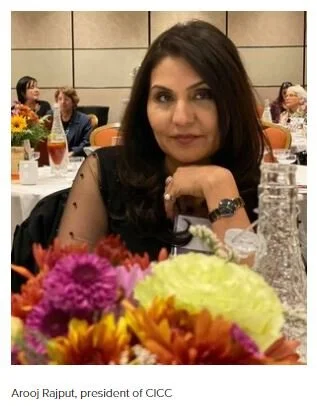WFWP Canada Hosts “Gender Equality: A Forward Looking Hopeful Perspective” Webinar Series
Written by Darlene McKewen
A month after WFWP Canada successfully held their first Global Women’s Peace Network webinar (see report), they continued this new online series with a webinar entitled “Gender Equality: A Forward Looking Hopeful Perspective” on August 15. This Zoom event, which reached a nationwide audience, included three guest speakers from various governmental and non-governmental agencies, and was adeptly moderated by Eveline Stewart, a longtime member and office holder of WFWP.
The first speaker, Harinder Malhi, was a former member of the Ontario Legislative Assembly (2014-2018) and parliamentary assistant to the former premier of Ontario, Kathleen Wynne. During her years as parliamentary assistant, she focused on women’s issues and subsequently was promoted to Minister of the Status of Women by this same premier.
Ms. Malhi touched on various issues in her speech, including women's rights, economic inequality, and the unique difficulties women are facing during Covid-19. She advocated for advancing legislation to help combat discrimination, which she believes in turn will advance the cause of women’s rights across the nation. Women should not solely focus on fighting against men, which she argued is all too often the center of the Me Too movement, but rather to “remember who we are fighting for and not against.”
The second speaker, Arooj A. Rajput, is an artist, broadcaster and author, who was also a clothing designer in her country of birth, Pakistan. Currently she is the director of a Canadian charity, the Human Necessity Foundation - Canada, and the president of an NGO called Creative Initiatives Community Canada (CICC). The nexus of her talk was a proposal to see men and women as complementary to each other, and that their cooperation can solve the bigger problem of human rights, of which gender inequality is a part.
Ms. Rajput highlighted the fact that even though developed countries like Canada have a constitution that protects women’s rights, many Canadian women do not know their rights and quietly tolerate abuse (domestic or job related) as a part of their lot in life. She stressed the need for education on a human level — advocating for the rights of all people — and that this will have a big impact on women’s equality as well. Human rights, she believes, will promote “less misery, less mental health issues, and even rid the business world of a toxic culture that can pervade the workplace.”
The final speaker was Daniel Stringer, co-founder of the National Capital Peace Council, which promotes peace through various community-based initiatives, including collaborations with indigenous people. He began by addressing the history of women’s inequality, reminding us that there are still Canadian women who remember a time when they could not vote, including his own mother.
Mr. Stringer then talked about the obstacles women have faced in taking on leadership roles, including in the Christian church, which was haunted by the sin of Eve in the Bible. While there has been great advancement of female leadership in recent decades, there was a dark side to trying to right a wrong. In the 1960s, the goals of the women’s movement expanded from getting the vote and equal pay to denigrating traditional feminine roles in the family and society, which has not helped Canada.
He ended his talk with a unique proposal to increase the number of women in government by having both a man and woman elected and then serve the same district together, since currently 75% of the Parliament is composed of men. However, the other speakers did not agree, preferring a system based on merit rather than quota, and they were willing to wait for this to happen. To add to these women’s opinions was a participant from Quebec, Pierre Beauregard, who said that in fact the CAQ, a relatively new party in the province of Quebec, was able to elect 40% of women into their legislature.
This hour-long webinar ended with final remarks by the president of WFWP Canada, Lilly Tadin. She said that women need to move forward with the idea that “peace starts with me in the family.” The family, she argued, is where all problems start and where they can be solved. Women have an equal position to men and are not put on this earth just to be protected by them, but to realize their own abilities to solve problems. She addressed the importance of education and mentioned some worthwhile programs within WFWP, such as the Leadership of Heart curriculum.
“You should not think that behind every great man is a great woman, but rather beside every great man is a great woman,” concluded Ms. Tadin. She was perhaps inspired to say this because the founder of the WFWP, Dr. Hak Ja Han Moon, indeed spent 54 years never behind but always beside a great man, her husband the late Rev. Sun Myung Moon.



